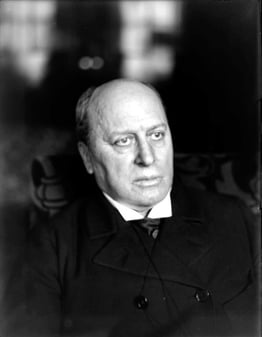On a recent trip to Italy, I had two tools at my disposal: a GPS and a guide book. Given the complexity of the network of roads and the simplicity of the road construction—often nothing more than ruts worn into gravel clinging precariously to hillsides—the GPS often failed me utterly. The guidebook, on the other hand, helped me navigate hill towns, wine cellars and even menus with amazing precision. It led me to all the destinations and experiences I had imagined before I left for Tuscany.
Navigating, however, is different from transporting. It is travel writing that allows us to venture vicariously from home sans GPS or guidebook. Henry James (1843-1916), the American-born British writer, brought his considerable talent to bear on the travel writing genre, capturing the geography, architecture and culture of the places he visited and, from the 21st Century perspective, allowing us to time-travel, as well.
 Henry James’ first travel book was A Little Tour in France (1884). It was originally titled En Provence and chronicled his six week tour of provincial towns. He arrived at the conclusion that “France might be Paris, but Paris is not France.” He levels some harsh criticism against some of the region, describing Burgundy, for instance, as “wanting in character,” and “narrow and crooked.” He has kinder words for Dijon. There he had walked an “autumnal avenue” without meeting another soul along the way until he reached “a charming public garden. At the end of it was a little river that looked like a canal, and on the further bank was an old fashioned villa, close to the water with a little French garden of its own.” He lingered on a nearby bench and reflected that “as the light faded in the Parc, the vision of some of the things [he] had seen became more distinct.”
Henry James’ first travel book was A Little Tour in France (1884). It was originally titled En Provence and chronicled his six week tour of provincial towns. He arrived at the conclusion that “France might be Paris, but Paris is not France.” He levels some harsh criticism against some of the region, describing Burgundy, for instance, as “wanting in character,” and “narrow and crooked.” He has kinder words for Dijon. There he had walked an “autumnal avenue” without meeting another soul along the way until he reached “a charming public garden. At the end of it was a little river that looked like a canal, and on the further bank was an old fashioned villa, close to the water with a little French garden of its own.” He lingered on a nearby bench and reflected that “as the light faded in the Parc, the vision of some of the things [he] had seen became more distinct.”
James sheds a different kind of light on London in his travel book, The English Hours (1905). In it, he embraces the city’s “deficits: the dense darkness of much of its winter, the soot on the chimney-pots and everywhere else, the early lamplight, the brown blur of the houses, the splashing of hansoms in Oxford Street or the Strand on December afternoons.” As a Midwesterner who each year must face down the harsh realities of winter, I am buoyed by what follows. “There is still something that recalls to me the enchantment of children—the anticipation of Christmas, the delight of a holiday walk—of the way the shop-fronts shine into the fog. . . .”
 Henry James’ travel book The American Scene (1907) is written with a reference to theater and the characters that inhabit the stage. He embarks on a coast-to-coast tour, with only his eastern seaboard reflections making it to publication. He paints a grim picture, apparently failing to find the silver lining he was able to detect in the London fog. The book is heavy with social commentary on what he considered the ruin of our “great, lonely land.”
Henry James’ travel book The American Scene (1907) is written with a reference to theater and the characters that inhabit the stage. He embarks on a coast-to-coast tour, with only his eastern seaboard reflections making it to publication. He paints a grim picture, apparently failing to find the silver lining he was able to detect in the London fog. The book is heavy with social commentary on what he considered the ruin of our “great, lonely land.”
In his final travel book, he leaves the brooding tone of The American Scene behind as he embarks on Italian Hours (1909). It includes charming descriptions of Italy’s famed cities. Of Venice he says:
“Venetian life, in the large old sense, has long since come to an end, and the essential present character of the most melancholy of cities resides simply in its being the most beautiful of tombs. Nowhere else has the past been laid to rest with such tenderness.”
Of Florence:
“I had never known Florence more herself, or in other words more attaching, than I found her for a week in that brilliant October. She sat in the sunshine beside her yellow river like the little treasure city she has always seemed. . .”
And finally, of Siena:
“Siena was long ago mellowed to the pictorial tone; the operation of time is now to deposit shabbiness upon shabbiness. But it’s for the most part a patient, sturdy, sympathetic shabbiness, which soothes rather than irritates the nerves.”
During my own trip to Italy, I realized that my guidebook and photos alone could never capture my experience. I embarked on a social media project that involved writing Letters from Tuscany. Through it, I was able to share my experiences with others while preserving special memories for myself. I learned how challenging it is to describe a destination in such a way that those who have never been there can see it for the first time and those who have been there can recall it in vivid detail. Yet Henry James does that and more. His detailed, poetic, and sometimes even grim descriptions give us not only a picture of a place on a map, but a specific lens through which to view it.









